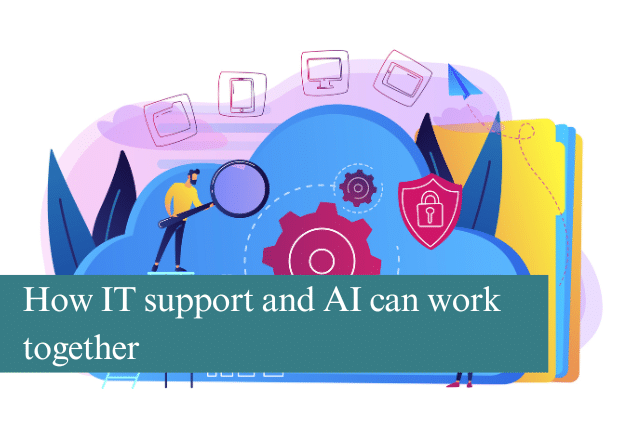
Whether it’s resolving technical issues, maintaining infrastructure or ensuring security, IT teams are the backbone of modern organisations. At the same time, artificial intelligence (AI) has emerged as a transformative technology, offering speed, efficiency and predictive capabilities that can complement traditional IT functions.
Rather than viewing AI as a replacement for IT support staff, businesses should consider how the two can work hand in hand. When combined, they create a powerful partnership that enhances efficiency, improves user experience and allows IT professionals to focus on higher-value tasks.
Streamlining Routine Tasks
A large proportion of IT support involves repetitive, routine requests. Password resets, software installations and troubleshooting common errors can consume valuable time that IT staff could otherwise dedicate to more complex challenges. AI-powered chatbots and virtual assistants can handle these requests quickly and efficiently.
For instance, an AI assistant integrated into a company’s service desk system can guide users through resetting their passwords or checking for known system outages. This automation reduces waiting times for employees while allowing IT teams to concentrate on issues that require human judgment and technical expertise.
Enhancing Remote Support
As hybrid and remote working models become the norm, IT support must adapt to new demands. AI can help by diagnosing problems remotely and providing guided solutions. Intelligent monitoring tools can detect issues with network connectivity, device health, or software compatibility, often before users are even aware of them.
In practice, this means fewer disruptions and faster resolution times. IT teams benefit from real-time insights generated by AI, making it easier to support distributed workforces and ensure productivity regardless of location.
Predictive Maintenance and Proactive Support
Traditional IT support often operates reactively, addressing problems as they arise. AI introduces the possibility of predictive maintenance, where potential issues are identified and resolved before they escalate. By analysing system logs, usage patterns, and historical incidents, AI can highlight warning signs such as declining hardware performance or unusual network activity.
This proactive approach reduces downtime, extends the lifespan of equipment, and improves overall reliability. IT professionals can then act strategically, using AI-driven insights to plan upgrades, schedule maintenance, and allocate resources more effectively.
Strengthening Cybersecurity
Cybersecurity is a growing concern for businesses of all sizes, and IT support teams are often the first line of defence. AI can significantly bolster these efforts by monitoring network traffic, identifying anomalies, and flagging suspicious activity in real time.
Machine learning models can detect unusual login patterns, potential phishing attempts, or malware behaviours that may go unnoticed by traditional security systems. Combined with the expertise of IT staff, AI ensures a stronger, layered defence. IT professionals can then focus on investigating alerts, responding to incidents, and implementing security policies, confident that AI is providing constant surveillance.
Improving User Experience
At its core, IT support is about helping people. Long wait times and unresolved tickets can be frustrating for employees, impacting productivity and morale. AI can improve the user experience by offering instant responses to common queries and guiding users through solutions step by step.
By integrating AI-driven self-service portals, employees gain greater autonomy in resolving issues without needing to raise a ticket every time. This does not replace human IT staff but rather enhances the support process, ensuring that when employees do escalate problems, they are met with faster, more informed responses.
Supporting IT Decision-Making
Beyond day-to-day support, AI provides valuable insights for strategic IT planning. By processing large amounts of data, AI can identify trends in system usage, highlight areas of inefficiency, and suggest opportunities for optimisation. For example, analysing software adoption rates could reveal underutilised tools, helping IT leaders make cost-effective licensing decisions.
Furthermore, AI can assist with capacity planning, ensuring infrastructure is scaled appropriately to meet future demands. These data-driven insights give IT teams the information they need to align technology investments with business goals.
The Human Element Remains Essential
While AI offers numerous benefits, it is important to emphasise that it cannot replace the human element of IT support. Complex problem-solving, empathetic communication, and creative thinking remain uniquely human strengths. AI can manage routine tasks and provide insights, but IT professionals interpret context, make judgement calls, and deliver personalised assistance.
The future lies in collaboration rather than substitution. By offloading repetitive duties to AI, IT staff are free to focus on innovation, strategy, and projects that add real value to the business.
Building a Future-Ready IT Support Model
To maximise the benefits of AI in IT support, businesses should take a considered approach. This includes:
- Integrating AI gradually into existing systems, starting with simple use cases like password resets or ticket categorisation.
- Providing training for IT teams so they understand how to work effectively with AI tools.
- Ensuring data security and compliance, as AI relies heavily on accessing and analysing sensitive information.
- Gathering feedback from end-users, to ensure that AI solutions genuinely improve their experience.
By aligning AI adoption with business objectives, organisations can build a support model that is both efficient and adaptable.
Conclusion
The partnership between IT support and AI holds lots of potential. AI excels at automating repetitive tasks, predicting issues and providing data-driven insights, while IT professionals bring critical thinking, communication skills and technical expertise. Together, they form a powerful combination that strengthens cybersecurity, enhances productivity and delivers a better experience for employees.
Contact us today and discover how our expert team can help you integrate intelligent solutions that boost efficiency, strengthen security and deliver a seamless user experience.
Recommended Posts

Is It Time to Move Away from Spreadsheets?
22nd August 2025

5 Signs Your Bradford Business Needs a Managed IT Partner
15th August 2025

5 Common IT Mistakes Businesses Make (and How to Avoid Them)
8th August 2025
